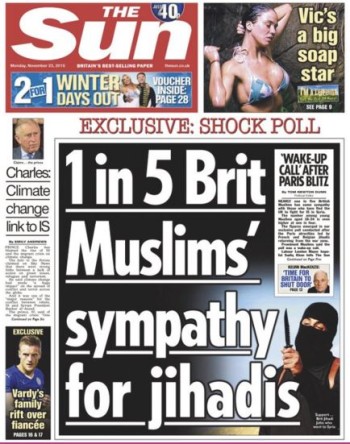
(Credit: The Sun, screenshot)
One in five British Muslims sympathize with terror group ISIS?
Last year, two UK News Corp. publications, the Sun and the Times, claimed so based on a poll it commissioned. As iMediaEthics reported at the time, the newspapers’ interpretation of the poll results was criticized, including by the polling company itself and iMediaEthics’ polling director David Moore.
Now, UK press regulator the Independent Press Standards Organisation (IPSO) has ruled against both newspapers, concluding they broke press standards with the misleading and inaccurate news coverage.
While IPSO received thousands of complaints expressing concern about accuracy and discrimination in the newspapers’ coverage, IPSO responded specifically to complaints from an organization in the UK called Muslim Engagement and Development about the accuracy of the reports.
The Sun disagreed with MEND’s complaints and stood by its interpretation and reporting.
MEND argued to IPSO that the Sun “distorted the poll results” because the poll question didn’t specify having sympathy for jihadis but instead could have also referred to people who leave the country to fight against ISIS.
Also, MEND pointed out that the poll respondents said they had sympathy “with” not “for.” That mattered, MEND argued, because “to express sympathy with those leaving the UK to fight in Syria could indicate that those surveyed empathised with the weakness of mind of the individuals fighting, and regretted their misguidance; it was misleading to present this as suggesting sympathy with the ideals of IS.” The Sun challenged that, saying essentially sympathy was sympathy.
MEND also said the Sun‘s coverage was “designed to inflame anti-Muslim sentiment” because it failed to include information about other polls that had similar results from non-Muslims, but the Sun said its poll and reports were independent.
IPSO said it’s OK to conduct a poll that could be found “distasteful or socially harmful” because it doesn’t break the IPSO code, and acknowledged the Sun‘s poll “used a reputable polling company” and “included the full text of the poll question, along with extensive commentary putting the findings into context.”
However, IPSO ruled the overall coverage was “significantly misleading” because the poll question didn’t specifically refer to ISIS. IPSO explained:
“While the newspaper was entitled to interpret the poll’s findings, taken in its entirety, the coverage presented as a fact that the poll showed that 1 in 5 British Muslims had sympathy for those who left to join ISIS and for ISIS itself. In fact, neither the question nor the answers which referred to ‘sympathy’ made reference to IS. The newspaper had failed to take appropriate care in its presentation of the poll results, and as a result the coverage was significantly misleading.”
IPSO dismissed complaints about discrimination because “these complaints did not raise a potential breach of the Code against any particular individual.”
“However, the Committee took this opportunity to note publicly that Clause 12 prevents pejorative or prejudicial reference to an individual’s race or religion,” IPSO wrote. “The article under complaint did not include pejorative or prejudicial reference to any individual.”
IPSO ordered the Sun to publish its ruling against the newspaper on the first five pages of the print edition and online. In addition, the Sun has to post the ruling below the headline of the online coverage from November if it doesn’t add “amendment.”
The Times of London, a fellow News Corp. paper, fared better with IPSO because, unlike the Sun, it published a Nov. 26 clarification acknowledging the reporting was misleading. That clarification read:
“We reported the findings of a Survation poll of 1000 British Muslims (News 24 Nov). Asked ‘How do you feel about young Muslims who leave the UK to join fighters in Syria?’, 14% of respondents expressed ‘some sympathy’ and 5 per cent ‘a lot of sympathy’. The survey did not distinguish between those who go to fight for Islamic State and those who join other factions in Syria, and it did not ask about attitudes towards Isis itself. Our headline, ‘One in five British Muslims has sympathy for Isis,’ was misleading in failing to reflect this.”
While the Times did break the code, because it published a timely clarification in print and online and in a prominent way, IPSO ruled that no further action by the Times was necessary.
When asked to comment on the ruling and the complaints, the Sun pointed iMediaEthics to its statements to IPSO. The Times said “We don’t comment on IPSO rulings; we publish any adjudications as necessary.”
When asked for comment on the IPSO rulings, the polling company that conducted the poll, Survation, referred iMediaEthics to its statement from November on the Sun‘s reporting where it said “to be very clear. Survation do not support or endorse the way in which this poll’s findings have been interpreted.”
In a statement on its website, MEND raised two concerns about the complaints process: 1) MEND says IPSO told them about the ruling more than a month before it was released, making it four months between complaint and resulting ruling. 2) The Sun published the ruling on a long weekend when many readers may not see it.
MEND also published a full list of its exchanges with the news outlets and IPSO. iMediaEthics has asked MEND if it is satisfied with the IPSO rulings.





